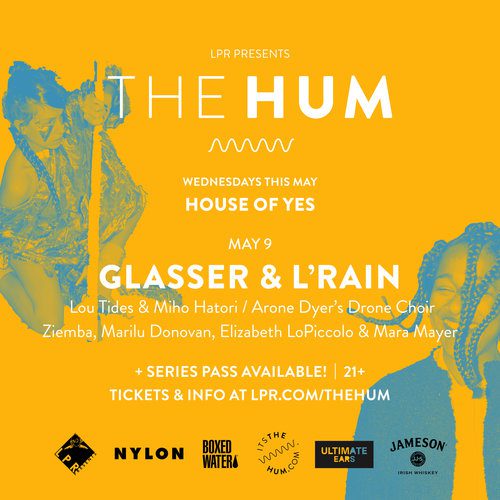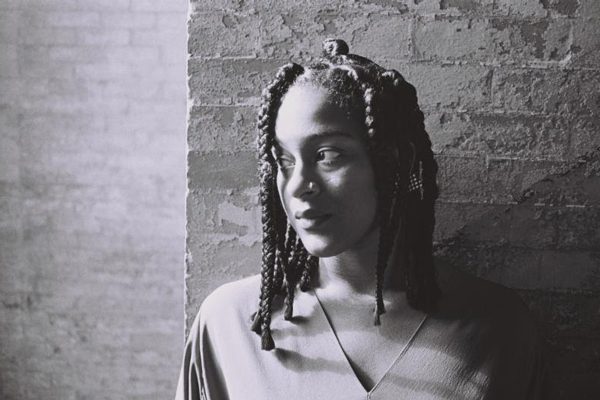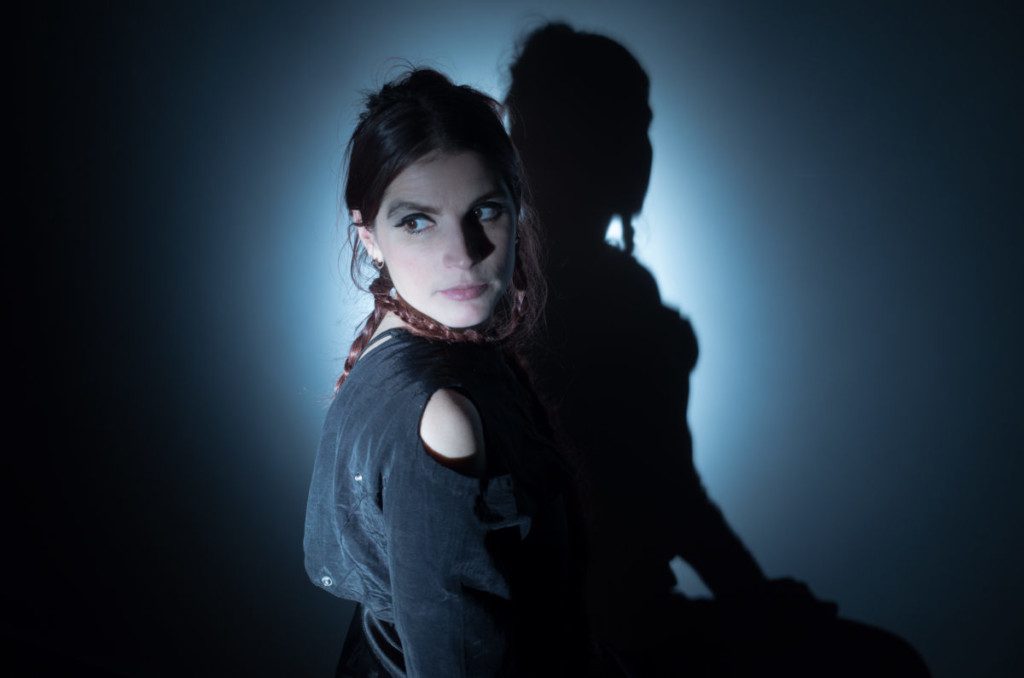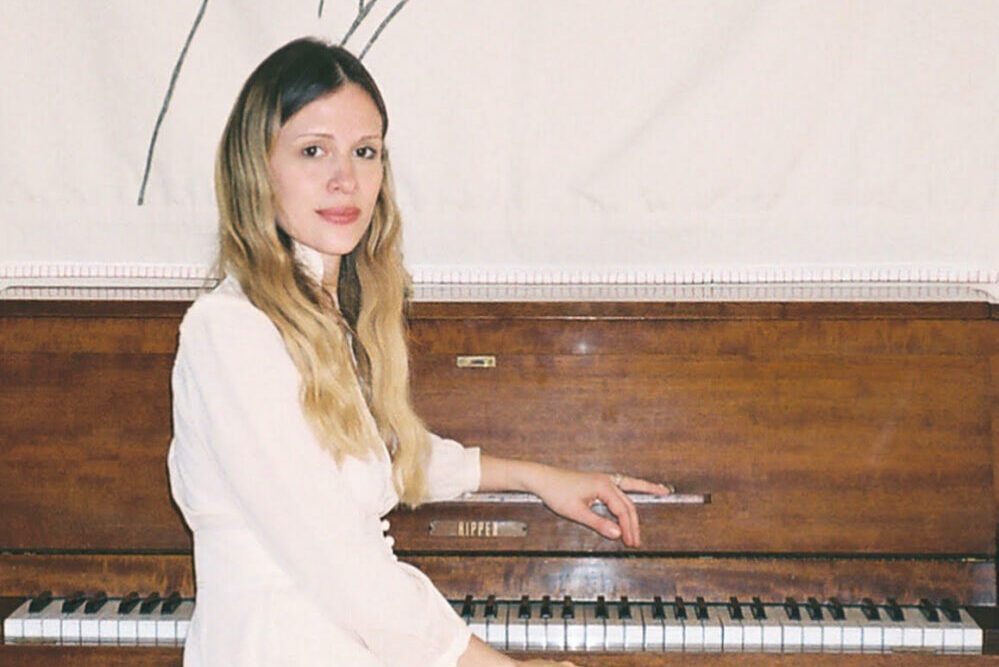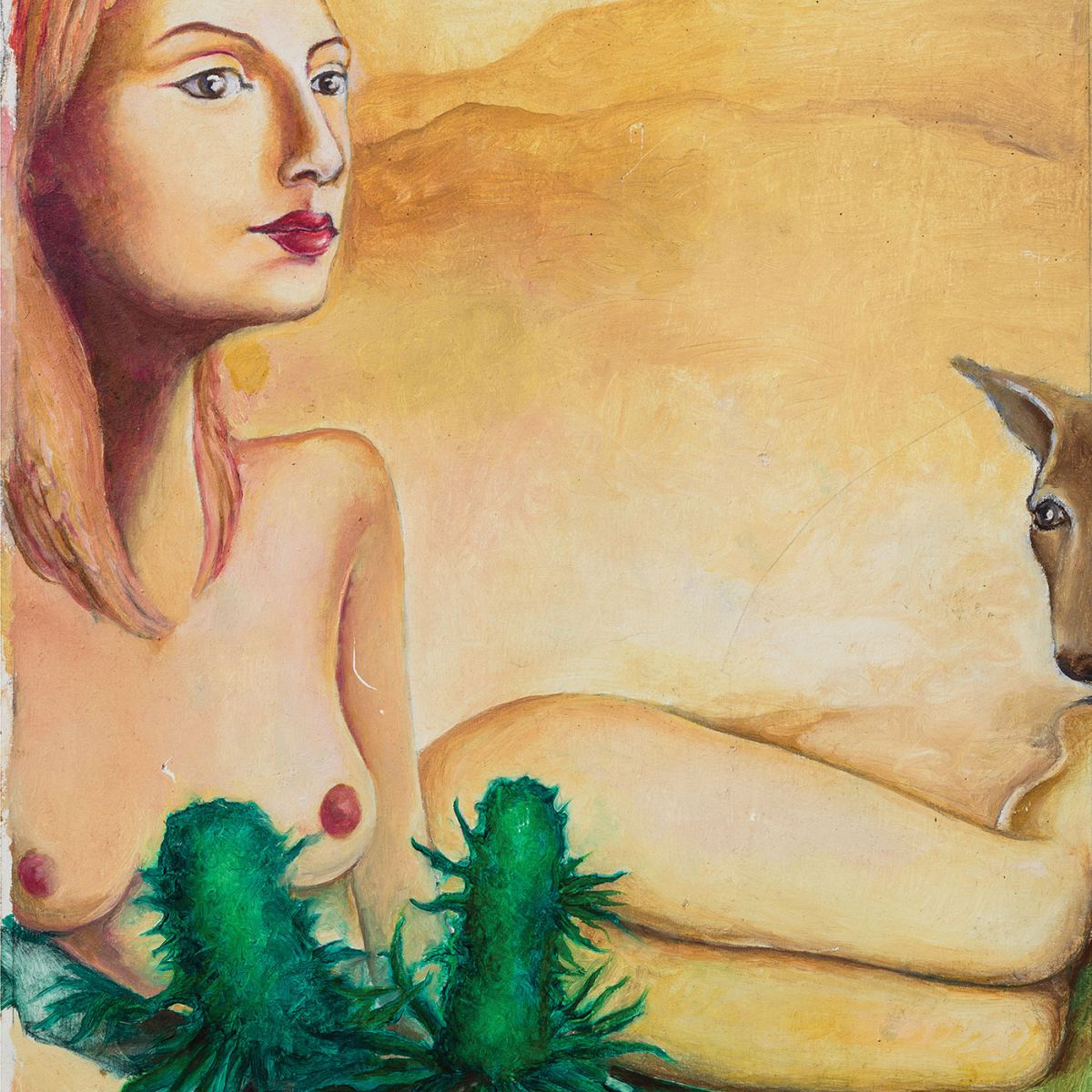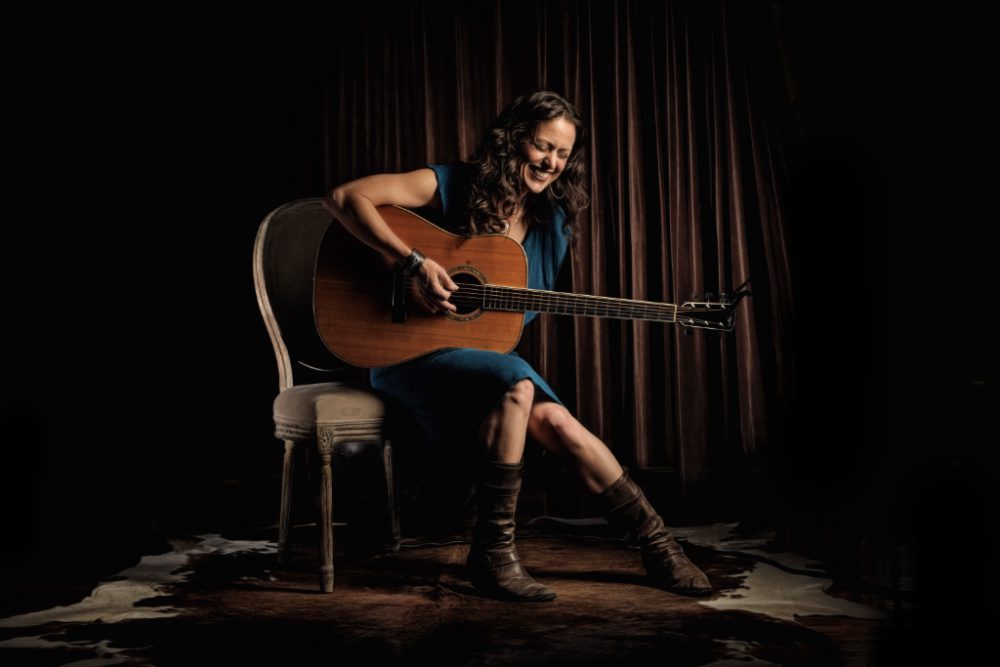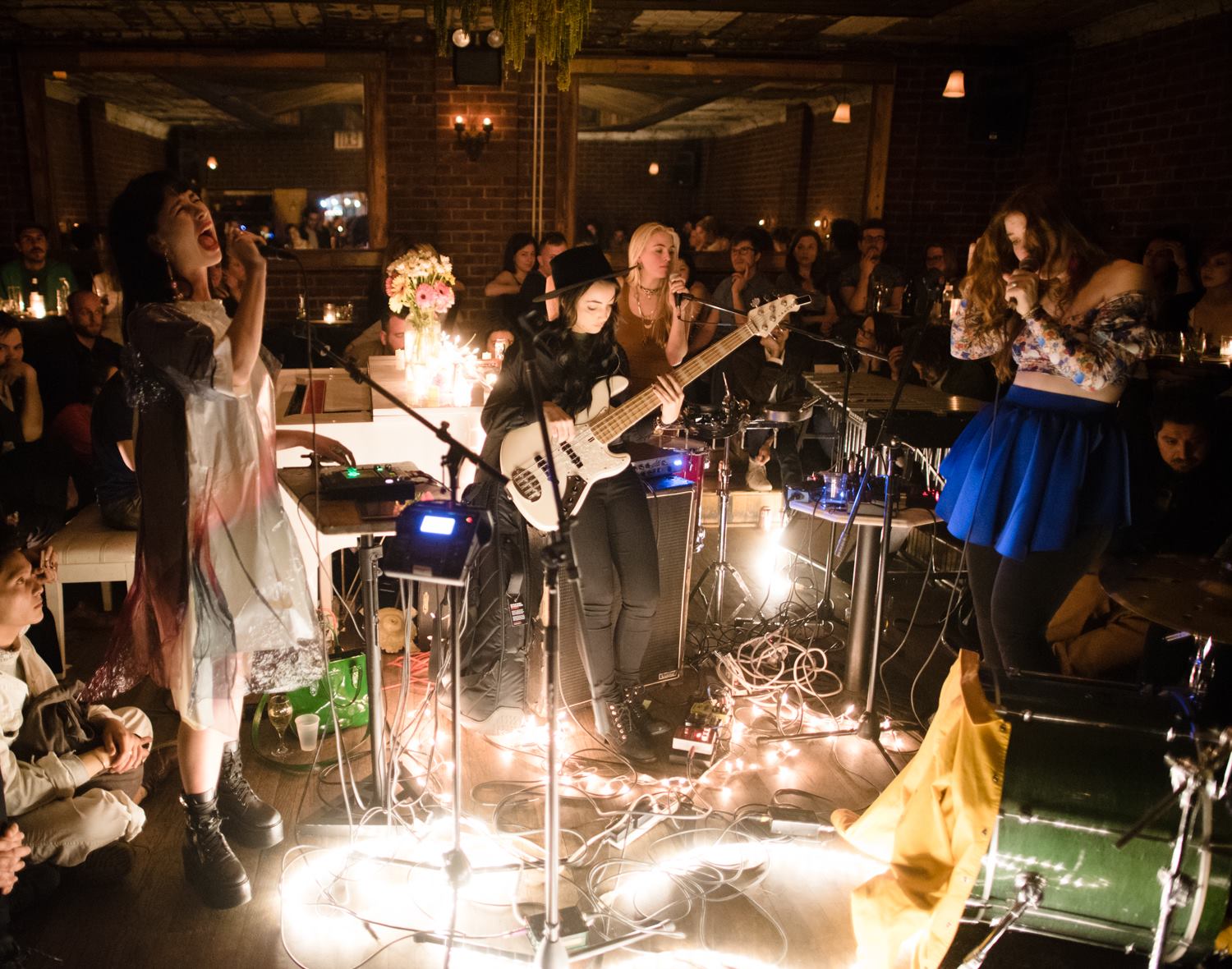
When Rachael Pazdan, curator of The Hum, first told me about the series years ago, she explained to me that despite it featuring all female lineups, she didn’t want that to be the only defining aspect of the showcase. Over the years The Hum has been spotlighted by media outlets, from The New York Times to Nylon to The Village Voice. Each one has focused heavily on the central aspect of The Hum as a female based residency. However, there are other unique aspects of The Hum that deserve to be highlighted.
While the artists for these events understand the importance of having an all-female space to perform in, there is a piece of the puzzle that gets overlooked when this becomes the only focus of the evening. The Hum is not merely a stage allotted for female artists – it is, down to its curation, a work of art. In each well crafted evening, Pazdan has complexly united a group of artists mined from her expansive work with the indie music scene. This is no hodgepodge of random artists, nor is it a night to go see your favorite musicians to hear their album tunes. The Hum is a stage for exploration and experimentation.
The feeling created on stage at The Hum is the closest audience members will get to experiencing the practice space of the musicians that inspire them. There is a vulnerability to this kind of space that pulls the imagination out of these performers and asks them to show the audience their unpolished selves.
In turn, the audience experiences a one-night-only evening of music which may only exist for the few minutes the musicians take the stage. A potent magic cumulates in the spontaneity and serendipity when a room full of people silently agree to participate in the unknown.
This Wednesday The Hum returns to The House of Yes with another incredible lineup of musicians. Lou Tides and L’Rain spent some time talking to Audiofemme about their previous experiences with The Hum, and what they are looking forward to this time around.
L’Rain
AudioFemme: This is your second time playing for The Hum. What was your first experience like?
L’Rain: It’s a little scary. It’s daunting to have all this time that you have to fill with new material with people that you haven’t played with before. But it’s the sort of thing that you want to do because of the people that are doing it. Building in an opportunity to work on new material is really important, and if you don’t have someone kick you in the butt it’s hard to do sometimes.
AF: Did you bring some of those experiences with you into the music that you created after The Hum?
LR: I will be. I wasn’t expecting to at all. I was kind of like, “Okay, these are some songs that we are gonna play once and that’s it,” but I’ve been thinking a lot about them lately. I’m hoping that I can find a way to build them into the next record that I make.
AF: You and Glasser will be collaborating at The Hum – I’m curious how you are bridging the difference between your slower and melodic style to Glasser’s more pop infused style for your performance?
LR: I feel like in the sessions that we’ve been having, we’ve been just improvising a little bit and seeing what comes out of it and it’s been sort of meditative in a way. Which I guess is half expected and half unexpected. We both are really into, I don’t want to say ambient music, but we both have an interest in Alice Coltrane, and textural electronic music, and I feel like that comes out in a lot of this. It could change in the next couple days, but at least right now, we both are playing synths and we’re singing and she’ll probably have some stuff in Ableton. Which I think is a totally new set up for both of us.
AF: How does having access to a showcase like The Hum impact your music individually, and your Brooklyn community of musicians?
LR: In my day job I program music and I often find that a lot of the other people I know who are booking music are usually not women. It’s been really nice to befriend someone [fusion_builder_container hundred_percent=”yes” overflow=”visible”][fusion_builder_row][fusion_builder_column type=”1_1″ background_position=”left top” background_color=”” border_size=”” border_color=”” border_style=”solid” spacing=”yes” background_image=”” background_repeat=”no-repeat” padding=”” margin_top=”0px” margin_bottom=”0px” class=”” id=”” animation_type=”” animation_speed=”0.3″ animation_direction=”left” hide_on_mobile=”no” center_content=”no” min_height=”none”][like Rachael Pazdan] who thinks about the composition of bills from an aesthetic standpoint with care, and also thinks about the people who are making that music. One isn’t more important than the other but she really thinks about them in tandem. There are so many people that are really careless with how they think through women and female-identifying musicians on bills. They’re like, “Oh, here are some women and they have nothing to do with one another,” and that has sort of become the norm in a lot of ways. That’s really lazy and infuriating so I think it’s important to have a series like The Hum. And the structure of it too, I feel like I have an opportunity to develop deeper relationships with musicians that I ordinarily wouldn’t. So it builds a community not in a superficial way, but in a real way.
AF: What is it about The Hum that creates that community and camaraderie?
LR: Each week is basically a series of mini commissions, so I think that structure, when you are working with someone that intently or that intimately on something, you just form a different kind of relationship with someone. Rather than just being on a bill with someone and there’s nothing that binds you to that person or connects you to that person. I think the focus on the process is an important one, and one that isn’t necessarily considered as much.
AF: Do you see the potential for something like this becoming more common?
LR: Yea. I think there’s been a little bit of a shift in the way people think about live music. I’ve seen more artists in general being interested in curating bills, and people generally trying to make special live experiences which is really great. I think there’s a lot of potential for more of that for sure. I think that people are hungry for creating special live experiences that you can’t find in other places and that audiences also are kind of seeking that out.
Lou Tides
AudioFemme: How did you get involved with The Hum?
Lou Tides: I did the first iteration of The Hum, which was at the Manhattan Inn. I think Rachael just told me about what she was doing, and I thought it was an interesting project, and so I decided to do it. That night I got to play with two people I had been wanting to play with for a while – Zoe Brecher, who plays drums, and Jen Goma, who has become one of my main collaborators musically, and just one of my best friends.
AF: And that was the first time you met Jen Goma?
LT: No, we had met previously at a friend’s house, and I really liked her vibe, so I asked her to do The Hum with me and had a great experience working with her, and Zoe as well. But Jen and I in particular continued a pretty special friendship and collaborative relationship ever since then.
AF: For this iteration of The Hum, you’ll be collaborating with Miho, correct?
LT: Yes. I don’t know if you know her music but she’s really amazing. We are going to do a more improvisational set. That’s something that will be new for me. Miho does a lot of improv. I’ve done a fair amount, but it’s not necessarily the thing that I do often, so it’s a challenge and it’ll be fun. I also adore Miho and her music, she’s a really amazing musician. I look up to her a lot so that’s exciting to have the opportunity.
AF: What is that process like when you are doing a collaborative improvisation?
LT: We are sharing a little bit of music beforehand, and then it’s gonna be pretty much flying by the seat of your pants. I find with improv that sometimes less preparation can be better, because then you have to be super present, and be in the moment. I’m also extreme so I’m sort of like either/or. I’m either gonna be super prepared and rehearse a ton, or you just go into it kind of having no game plan. I also have never worked with Miho, so it’ll be really interesting to get into a room in front of people and do live experimentation. Which is nerve racking, but is also so exciting at the same time.
AF: How has collaborating with Jen Goma and other female musicians impacted your work?
LT: Well, I suppose something that was big about the collaborative process of The Hum, for me, was that, I’ve been in a lot of bands which are naturally collaborative, but also sometimes there tends to be one person who is the leader. Jen and I went into that situation as equal songwriters, so it’s been really interesting working with her. Really, really stepping back and exchanging ideas 50/50, rather than there being more of a songwriter/band dynamic. It’s enjoyable to create something as a whole, and not with so much ownership. And I think women can be pretty open with that too. I mean men can too, but there’s something about women – sometimes they’re a little bit less possessive of their ideas, so that’s been a really good practice for me to let go, and not be possessive, because it creates so much more beauty.
I also find it really enjoyable to listen to afterwards, because then I don’t hear as much of myself in it. So I become, therefore, less controlling. Collaboration has just become a much more interesting thing to me. And a lot of that has to do with The Hum, because I didn’t always collaborate as a songwriter before that.
AF: You’ve been switching your musical identity – can you speak a little on that process?
LT: I’ve been playing in bands for 10 years now – well, longer, but really actively and furiously, my two other projects added up to about 10 years. I think maybe it’s just time to try different avenues for myself. I’m interested in exploring a different way of doing things. It’s been an incredible amount of hard work and very difficult and very taxing, just as far as reshaping myself. Because I don’t have anything released I haven’t had some catharsis of the letting go of the process because I’m still in it, and it can be kind of exhausting. It’s a little abstract, I don’t know how much I can fully dig in without getting really out, I suppose it’s been about being less attached to form, and less attached to the idea of what something should be, and really just following where something wants to go. I’m trying to find new pathways. It’s both exciting, and scary, and exhausting at the same time.
AF: How does having access to a showcase like The Hum affect the Brooklyn music community?
LT: I think it’s great in the sense that – again back to the idea of ownership, and lack of ownership – part of collaboration is community and creating community. I think that especially in a time where it’s very difficult to make money and a living at music, that all the more emphasis on community is important. An event like The Hum is wonderful in that sense because it brings people together for those reasons. I hope that it encourages other programming that is more about a night and celebrating people doing something as a collaborative mass. People are going to the event to see the event, rather than paying all this money to see this person that is celebrated and in tons of print and magazines or whatever, because people think that’s what they should see, or because that’s the great person of the moment. It’s about celebrating community, and we don’t see much of that these days, so it’s definitely refreshing.[/fusion_builder_column][/fusion_builder_row][/fusion_builder_container]

